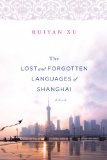Page 2 of 5
There are currently 32 member reviews
for The Lost and Forgotten Languages of Shanghai
-
Susan P. (Boston, MA)
Disordered Lives from Disordered Language
Aphasia literally means "no speech," but neurologists define it as a "language disorder." This nicely conveys the disorder to some lives that bilingual aphasia creates for several people.
From a traumatic brain injury, a successful young Shanghai businessman loses his ability to speak/write in his dominant, but second, language (Chinese) while being able to speak his first language, English (bilingual aphasia). Truculent at first to work on his rehabilitation, he improbably changes toward those who speak English and those who don't. His relationship with his wife was confounding but fascinating, and I wondered: Were they becoming the people they always were, deep down? And does the American neurologist, an authority but a naive person, help at all?
A fascinating but clear-eyed view of contemporary Shanghai (the heat, food, ex-pat community, buildings) as well as the flawed people making mistakes and the others observing them.
Very enjoyable and compelling insights into an amazing city and its people. A good "you are there" feeling -- enough to make you talk to the characters to say, "Aw, stop, don't do that.."
-
Karla S. (Dana Point, CA)
"How can we be friends if we don't communicate?"
This book is about how isolated each character feels when they are unable to communicate with one another. An explosion tore apart the Li family and they had to rebuild, learn how to live with loss, grief, betrayal and redemption. Beyond the family there is portrayed the culture clashes between the immigrants, expats, and the Shanghai population. This first novel shows Ruiyan Xu to be a gifted novelist who understands her subject. I hope we soon find other books by this author. This book is one I could not put down until I finished the last page.
-
Jane A. (Lakeport, Ca)
The Lost and Forgotten Languages of Shanghai
I felt that this was going to be a good book, and I wasn't disappointed!
I take 'communication' for granted, and it was fascinating to see how this story developed in a small family for whom this essential tie was disrupted when the head of the household was afflicted with 'bilingual aphasia'. The author handled the telling in a detailed, yet gentle manner, and each facet of the story compelled the reader to go on to the next.
I found the writing to be quite good in itself.
I will definitely recommend this book to my two book clubs!
-
Erica M. (Chicago, IL)
Lost and Forgotten Languages of Shanghai
This book starts out painfully slowly, but is so worth staying with. The title hints at the basic premise of the book - a man sustains brain damage and suffers from the inability to speak in Chinese; he can only communicate in the language of his childhood, English. He can no longer speak to his wife, only his American doctor. But it really discusses communication on many different levels. It was a complex and lovely book that I fear might be an overlooked. A loss for those who miss it.
-
Georgette I. (Oxford, GA)
The Lost and Forgotten Languages of Shanghai
"The Lost and Forgotten Languages of Shanghai" authored by Ruiyan Xu is one of the most beautiful and absorbing novels I have read. She presents us with multidimensional characters who deal with issues of communication that are both obvious and nuanced. The main story line involves Li Jing, a successful businessman who after an explosion suffers from a form of aphasia that affects the portion of the brain that manages language. Although fluent in both English and Chinese he recalls only English as he begins to recover leaving him unable to communicate with his wife, child, friends and associates.
Dr. Rosalyn Neal, an American specialist is recruited by his wife and doctors to help him relearn Chinese. As the characters and story evolve the reader is gently led through the various forms of language both verbal and nonverbal that can strengthen or weaken relationships. Xu weaves and layers the struggles of Li Jing, his wife Meiling, their son Pang Pang, Dr. Neal and her expatriate friends, and Alan, the translator against the backdrop of language in its various forms. This book is enjoyable on many levels from the intricate relationships to the spectacular descriptions of Shanghai. It will charm readers while provoking thoughtful discussions on a myriad of topics. This novel grips the reader from page one and never lets go.
-
Aprile G. (Northampton, Massachusetts)
The Loss of Language
"The Lost and Forgotten Languages of Shanghai" is a lyrical, haunting, and engrossing book about how language and culture, and the understandings and misunderstandings that they engender, both tie people together and break them apart.
When the central character, Li Jing, has a brain injury that suddenly makes him unable to speak a word of Chinese (although he still understands it), his world, and that of his wife, father, and son, is thrown into turmoil. The parallel experiences of his American doctor, Rosalyn Neal, of isolation and connection are compelling, and ultimately heartbreaking. The book chronicles the characters' struggles, moments of connection, and missteps so seamlessly that you feel you are experiencing what the characters are experiencing. This is a book to be savored, and there is much to spark lively discussion.
-
Rachel D. (Leominster, MA)
The Lost and Forgotten Languages of Shangha9
This is a novel of love and heartache. A book that I couldn't put down until I had finished it. The author shows such insight into the human emotions of the characters that it captures you from the very beginning.
